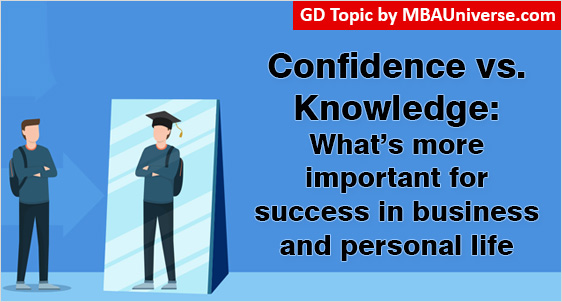
“Confidence Vs Knowledge is an important GD topic of Abstract nature. This Group Discussion Topic “Confidence Vs Knowledge” is making rounds in GD for final selection in top MBA colleges including XLRI, IIMs, FMS and other important class 1 and class 2 services. The solved GD topic “Confidence Vs Knowledge is shared below for your understanding with key facts and will help you in preparing for GD round.
Confidence and knowledge are two vital attributes that often stand at the forefront of personal and professional success. They are frequently seen as contrasting forces, but in reality, the most effective individuals understand the value of balancing these qualities. This is a popular GD Topic for MBA Admissions and selection interviews for Banking and Corporate Jobs. This article delves into the dynamic interplay between confidence and knowledge, highlighting their significance, and providing global and Indian examples to illuminate this crucial relationship.
Understanding Confidence
Confidence is the belief in one's ability to accomplish a task, overcome a challenge, or navigate life's complexities. It's the self-assurance that empowers individuals to take action and make decisions. Confidence is often visible in one's body language, tone of voice, and overall demeanor. While self-assuredness can be a powerful asset, it can also lead to overconfidence if not tempered by knowledge and a realistic assessment of one's abilities.
Understanding Knowledge
Knowledge is the accumulation of information, skills, and expertise gained through learning and experience. It is the foundation upon which confident decisions and actions are based. Knowledge is not limited to academic qualifications but encompasses practical wisdom and the ability to apply what one knows in various situations. While knowledge is essential, an excess of it without the confidence to act can lead to indecision and missed opportunities.
The Global Perspective
Example 1: Steve Jobs
Steve Jobs, the co-founder of Apple Inc., serves as an iconic example of the confidence-knowledge balance. Jobs was known for his unwavering confidence in his vision for innovative technology products. His confidence led to groundbreaking products like the iPhone and iPad, which transformed the tech industry. However, Jobs' confidence was deeply rooted in his profound knowledge of design, technology, and user experience. His relentless pursuit of knowledge allowed him to revolutionize multiple industries.
Example 2: Apollo 11 Moon Landing
The Apollo 11 moon landing represents a colossal feat of human achievement. Astronauts Neil Armstrong and Buzz Aldrin displayed immense confidence as they took those historic first steps on the moon's surface. However, this confidence was not blind; it was built upon the knowledge, training, and meticulous preparation by NASA's engineers and scientists. The mission's success was a testament to the meticulous combination of confidence and knowledge.
Example 3: Elon Musk
Elon Musk, the entrepreneur behind companies like SpaceX and Tesla, is another compelling global example. Musk's unwavering confidence in his vision for sustainable energy and space exploration is evident to the world. Yet, what sets Musk apart is his deep knowledge of engineering, physics, and business. His successful ventures are a testament to the symbiotic relationship between his confidence and knowledge.
The Indian Perspective
Example 1: Ratan Tata
Ratan Tata, the former chairman of Tata Sons, is an exemplary figure in India. He displayed confidence and knowledge in his leadership and decision-making. Under his tenure, the Tata Group expanded globally and diversified into numerous industries, from automobiles to information technology. This expansion was driven by Tata's confidence in the company's capabilities and his vast knowledge of various business domains.
Example 3: Dr. A.P.J. Abdul Kalam
Dr. A.P.J. Abdul Kalam, the former President of India and a renowned scientist, embodied the confidence-knowledge equilibrium. He displayed immense confidence in India's capabilities to excel in space and defense technology. His confidence was, however, fortified by his extensive knowledge and contributions to the development of India's space and missile programs. Dr. Kalam was both a visionary and a scientist.
The Balancing Act
Finding the ideal balance between confidence and knowledge is not always straightforward. Overconfidence can lead to rash decisions, while excessive knowledge can result in hesitancy. Here are some key considerations for striking the balance:
- Self-awareness: Understanding one's strengths and weaknesses is the first step. This awareness allows individuals to confidently leverage their strengths while seeking knowledge to address their weaknesses.
- Continuous Learning: Knowledge is a lifelong pursuit. Confident individuals recognize that learning is an ongoing process, and they remain open to new information and experiences.
- Risk Management: Confidence should be coupled with prudent risk assessment. A balanced approach involves assessing the potential outcomes of decisions and mitigating risks where necessary.
- Adaptability: The world is ever-evolving. Confident individuals are adaptable and open to change. Knowledge is a dynamic force that empowers individuals to adapt to new situations.
- Collaboration: Confidence doesn't mean having all the answers. Collaboration with others, who may possess complementary knowledge and skills, is a wise approach.
Conclusion
The interplay between confidence and knowledge is a delicate balance that can significantly influence personal and professional success. As illustrated by global and Indian examples, the synergy of these attributes can lead to remarkable achievements. Striking this balance is a lifelong journey, requiring self-awareness, a commitment to continuous learning, and adaptability. Whether in the boardroom, the laboratory, or the entrepreneurial world, recognizing the inherent value of both confidence and knowledge is the path to excellence. In essence, it's not a question of "confidence vs. knowledge" but rather "confidence balanced with knowledge" that leads to true mastery.
Hope you found this solved GD topic “Confidence Vs Knowledge” useful to prepare for your Group Discussion round. The candidates who are preparing for MBA exam and are to appear in GD round should prepare the key aspects of this Group Discussion topic “Confidence Vs Knowledge” along with other GD topics.






























